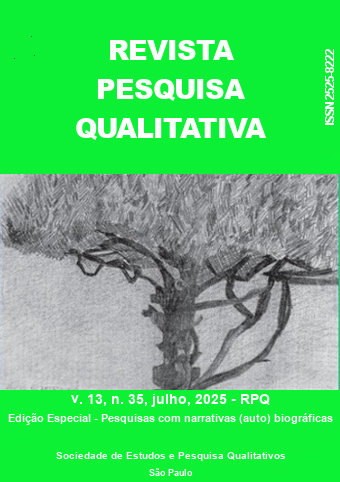The weaving of knowledge: a report of teaching and learning experience in the indigenous degree program
DOI:
https://doi.org/10.33361/RPQ.2025.v.13.n.35.1081Keywords:
Indigenous Education, Inclusive Methodology, Final Course Project (TCC), Intercultural TeachingAbstract
The article reports on the teaching experience in the Course Completion Work 1 module, delivered during the first semester of 2024 as part of the Intercultural Degree in Indigenous School Education at the Universidade do Estado da Bahia (UNEB), Campus 8, in Paulo Afonso. The approach emphasises the preparation, execution, and impacts of pedagogical practices, highlighting the integration between academic and traditional knowledge. The central objective was to value the academic production of indigenous students, strengthening their cultural identities through the development of their dissertation projects. Methodologies adapted to indigenous epistemologies were employed, respecting their specificities, such as orality, the appreciation of ancestral knowledge, and the centrality of territoriality while also meeting academic methodological requirements. Beyond enabling the development of dissertation projects, the pedagogical practice reaffirmed students' histories and identities, fostering a space for dialogue between science and culture. The experience demonstrated that valuing traditional knowledge can enrich academic training and contribute to the preservation of Indigenous cultures through observable outcomes such as strengthening students' self-esteem by recognising their knowledge within the academic environment; the production of written materials that document and disseminate cultural and historical aspects of Indigenous communities; and the establishment of closer ties between the university and Indigenous communities, promoting knowledge exchange.
Downloads
References
BAHIA. Povos indígenas da Bahia. Disponível em: https://www.bahia.ba.gov.br/povos-indigenas/ Acesso em: 10 mar. 2025.
BRASIL. Resolução CNE/CEB nº 3, de 14 de setembro de 1999. Diretrizes Curriculares Nacionais para a Educação Escolar Indígena. Diário Oficial da União: seção 1, Brasília, DF, 15 set. 1999. Disponível em: http://www.in.gov.br/web/dou/-/resolucao-cne-ceb-n-3-de-14-de-setembro-de-1999-21991568 Acesso em: 12 mar. 2025.
BRASIL. Resolução CNE/CEB nº 3, de 14 de setembro de 1999. Diretrizes Curriculares Nacionais para a Educação Escolar Indígena. Diário Oficial da União: seção 1, Brasília, DF, 15 set. 1999. Disponível em: http://www.in.gov.br/web/dou/-/resolucao-cne-ceb-n-3-de-14-de-setembro-de-1999-21991568 Acesso em: 12 mar. 2025.
BRASIL. Lei nº 9.394, de 20 de dezembro de 1996. Estabelece as diretrizes e bases da educação nacional. Diário Oficial da União: seção 1, Brasília, DF, 23 dez. 1996. Disponível em: http://www.planalto.gov.br/ccivil_03/leis/l9394.htm Acesso em: 22 jan. 2025.
FERREIRA, T. R.; RODRIGUES, E. M. da R. Perspectiva intercultural em práticas de formação de docentes indígenas. Revista Linguagem & Ensino, [S.I.], v. 23, n. 4, p. 1204-1223, 2020. Disponível em: https://doi.org/10.15210/rle.v23i4.1855 Acesso em: 22 jan. 2025. DOI: https://doi.org/10.15210/rle.v23i4.18551
FREIRE, P. Pedagogia do Oprimido. 63. ed. Rio de Janeiro: Paz e Terra, 2005.
HOOKS, b. Ensinando a Transgredir: A Educação como Prática da Liberdade. São Paulo: Editora WMF Martins Fontes, 2017.
INSTITUTO BRASILEIRO DE GEOGRAFIA E ESTATÍSTICA – IBGE. Cidades e Estados: Paulo Afonso (BA). Disponível em: https://www.ibge.gov.br/cidades-e-estados/ba/paulo-afonso.html Acesso em: 10 mar. 2025.
JEKUPÉ, O. Tekoa: Conhecendo uma aldeia indígena. São Paulo: Hedra, 2015.
KRENAK, A. Ideias para Adiar o Fim do Mundo. São Paulo: Companhia das Letras, 2019.
MELIÁ, B. Educação indígena na escola: educação indígena e interculturalidade. Cadernos Cedes, [S.I.], n. 49, p. 11-17, 2000. DOI: https://doi.org/10.1590/S0101-32621999000200002
PARAÍSO, M. A. Metodologias de pesquisas pós-críticas em educação e currículo:trajetórias, pressupostos, procedimentos e estratégias analíticas. In: MEYER, D. E.; PARAÍSO, M. A. (org.). Metodologias de pesquisas pós-críticas em educação. Belo Horizonte: Mazza Edições, p. 25- 48, 2012.
PIMENTEL DA SILVA, M. do S.; ROCHA, L. M. Educação bilíngüe intercultural entre povos indígenas brasileiros. Extensão e Cultura, [S.I.], n. 2, p. 1-5, 2006.
POTIGUARA, E. Metade cara, metade máscara. 3. ed. Rio de Janeiro: Grumin, 2018.
RITA, G. do N. Educação superior de professores indígenas no Brasil: avanços e desafios do Programa de Licenciaturas Interculturais Indígenas. Educação Superior e Sociedade, [S.I.], v. 20, n. 20, p. 49-76, 2019. Disponível em: https://ess.iesalc.unesco.org/index.php/ess3/article/view/19 Acesso em 14 jan. 2025
SANTOS, A. B. Composto escola: comunidades de sabenças viva. São Paulo: Editora Expressão Popular, 2021.
VIVEIROS DE CASTRO, E. Metafísicas Canibais: Elementos para uma Antropologia Pós-Estrutural. São Paulo: Cosac Naify, 2015.
Downloads
Published
How to Cite
Issue
Section
License
Copyright (c) 2025 Qualitative Research Journal

This work is licensed under a Creative Commons Attribution 4.0 International License.
Essa revista é licenciada pelo sistema creative commons 4.0, não-comercial.
















